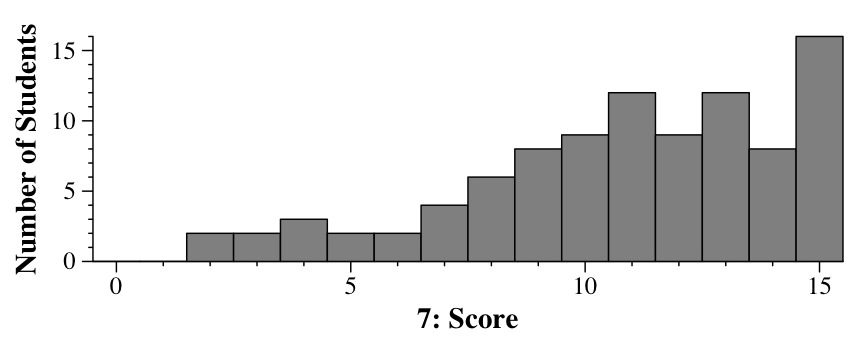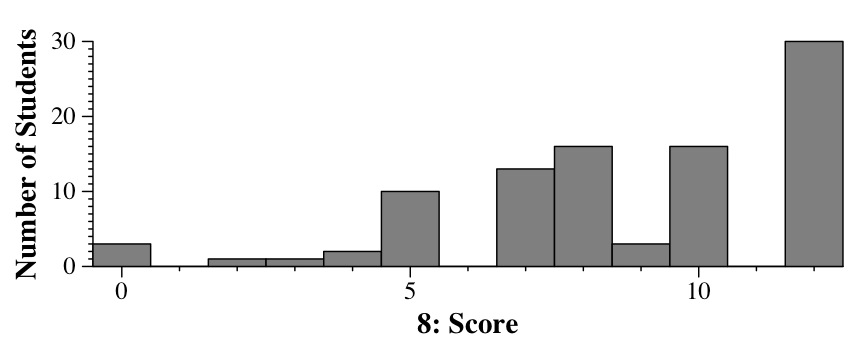CS140 Midterm Exam - March 11, 2014 Answers and Grading
James S. Plank
Question 1: X Points
Part A: You start at 98, and look at successively higher indices mod 100: 98, 99, 0, 1.
Part B: Now, you start at 98, and add 02, 12, 22 and
32: 98, 99, 2, 7.
Part C: Now, you start at 98, and add 0*21, 1*21, 2*21 and 3*21:
98, 19, 40, 61.
Grading
1 point per answer, with the following caveats:
- Part A: To receive full credit on the 2nd, 3rd and 4th probes, they had to equal
the previous probe plus one, mod 100.
- Part A: If you said 1 instead of 0, you got half credit.
- Part A: If you forgot the mod 100 when you added one, you got half credit.
- Part B: To get full credit, your answer for the first probe had to equal
the answer for the first probe in part A.
- Part B: The other probes needed to be relative to the first probe.
- Part B: If you forgot the mod 100, you got half credit.
- Part B: On the third and fourth probes, if you were off by one, you got
half credit.
- Part C: To get full credit, your answer for the first probe had to equal
the answer for the first probe in part A.
- Part C: The other probes needed to be relative to the first probe.
- Part C: If you forgot the mod 100, you got half credit.
- Part C: On the second, third and fourth probes, if you were off by one, you got
half credit.
Question 2: 10 Points
Suppose that the file that implements the methods is imp.cpp, and the file
that uses the methods is use.cpp. I need to have a header file that both
imp.cpp and use.cpp include using "#include" statements.
The header file will define the class. In this definition, the methods will be
"public" and the data will be "protected. When I compile the program, I will
run g++ on the files imp.cpp and use.cpp. I do not include the
header file in my compilation.
Grading
Three points per part. You couldn't say "just use make."
Question 3: 6 Points
When you erase an element from the beginning of a vector, the standard template library
does the following (assume the vector is v):
for (i = 0; i < v.size()-1; i++) v[i] = v[i+1];
v.resize(v.size()-1);
|
The running time complexity if that is linear in the size of the input, which makes this
perform very poorly. If you want to delete elements from the beginning of a data structure,
you should use a deque, because the deletions take constant time rather than linear time, and
you can still access the elements like a vector.
Second in preference is a list, which also has constant time access, but now you have to use
iterators for access.
Grading
Three points for your explanation, and three points for the alternate data structure.
If you said list rather than deque, you lost a point, because a deque lets you access
elements like a vector.
Question 4: 9 Points
Straight from the lecture notes on lists:
main()
{
list <string> l;
list <string>::iterator lit;
string s;
while (getline(cin,s)) l.push_front(s);
for (lit = l.begin(); lit != l.end(); lit++) cout << *lit << endl;
}
|
You could create the list with push_back() and traverse it with a reverse iterator.
That works too.
Grading
This is one where you started with 9 points and we deducted for various things.
Question 5: 12 Points
This is a stringstream question:
main(int argc, char **argv)
{
istringstream ss;
double d1, d2;
if (argc != 3) { cerr << "Bad\n"; exit(1); }
ss.clear(); // This is optional.
ss.str(argv[1]);
if (!(ss >> d1)) { cerr << "Bad\n"; exit(1); }
ss.clear();
ss.str(argv[2]);
if (!(ss >> d2)) { cerr << "Bad\n"; exit(1); }
cout << d1 + d2 << endl;
}
|
Grading
12 points. Grading is like Question 4.
Question 6: 10 Points
string a(string &s)
{
int i;
string rv;
rv = s;
for (i = 0; i < rv.size(); i++) {
if (rv[i] >= 'A' && rv[i] <= 'Z') rv[i] += ('a'-'A');
}
return rv;
}
|
Grading
10 points. Grading is like Question 5.
Question 7: 15 Points
There are plenty of solutions. My solution below takes each word and creates
a new word consisting of only the non-vowels. If that word is of size zero, then
I simply use the original word.
class WordModifier {
public:
vector <string> ModList(vector <string> text);
};
vector <string> WordModifier::ModList(vector <string> text)
{
vector <string> rv;
string nw;
string vowels;
int i, j;
char c;
vowels = "aeiou";
for (i = 0; i < text.size(); i++) {
nw = "";
for (j = 0; j < text[i].size(); j++) {
c = text[i][j];
if (vowels.find(c) == string::npos) nw.push_back(c);
}
if (nw.size() == 0) {
rv.push_back(text[i]);
} else {
rv.push_back(nw);
}
}
return rv;
}
|
Grading
10 points. Grading is like Question 6.
I took off for using erase(), not just because it makes for an n2
algorithm, but your indices are typically messed up afterward.
Question 8: 12 Points
It's best to look at pictures -- a and b hold ints, c and d hold pointers to ints.
After the first two statements, we have set a to 22 and c so that it points to a:
In the next two statements, we set b to *c, which is 22. Then we increment a by 10.
This is what the variables look like:
So the first three cout statements are:
Now, in the next four statements, we set c to a newly allocated four bytes, and then set
them to 88. We set d to point to the memory to which c points, and then we set a to
equal what *c, which is 88. Here are the variables:
Now, we set *c to 77, which changes those four bytes. a remains at 88, so when we set
b to a, it is 88. Then incrementing it by five yields 93. Here is the final state of
the variables:
The output is:
A: 88
B: 93
*C: 77
*D: 77
|
Grading
1.7 points per line, except for the first, which was 1.8. The last line had to equal
the penultimate line.












